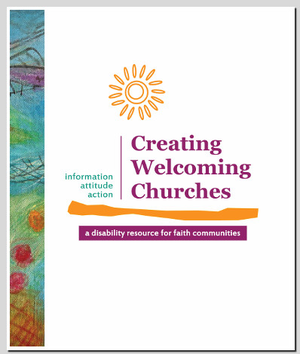
Reverend Vicki Terrell at her ordination at Auckland Anglican Cathedral, November 2008, with friends (from left) Carolyn Wadsworth, Robyn Hunt, Wendi Wicks, and Pam Cook.
Creating Welcoming Churches is a disability resource for faith communities promoting the greater inclusion of Disabled worshippers.
It was produced by the Disability, Spirituality and Faith Network Aotearoa/New Zealand as a guide on how to make church environments more accessible to all people – including people living with disability.
Mike Gourley attended one of the launch celebration services and canvassed opinions on the booklet.
Reverend Vicki Terrell was ordained an Anglican Priest in November 2008. But her journey wasn’t easy. Vicki has lived with cerebral palsy since birth. And she’s the first to admit that the condition has affected her speech, a circumstance that made the powers that be concerned she wouldn’t be able to hold her own in a Parish.
But Vicki and her friends thought outside the square, and came up with innovative ways to ensure she could lead a congregation in worship. They included use of written text, Powerpoint presentation.
When it came to her ordination, once again her speech impediment looked becoming a barrier, but in the end, Vicki Terrell perservered, and with the help of a friend, completed the process successfully.
 Vicki’s experience, and her expertise in advising on institutional policy and practice concerning disability issues, made her an obvious choice for the role of Researcher and Writer in the preparation of a Disability Resource for Faith communities, entitled ‘Creating Welcoming Churches’. The publication, launched last year, is the combined effort of Vicki and other members of the Disability, Spirituality and Faith Network of Aotearoa New Zealand: desktop publishing and production was by Trish Harris, and the Network’s Think Tank for the project comprised, Gillian Bell, Pamela Cook, Peter Cowley, Rosalie Sugrue, Rhonda Swenson, and Carolyn Wadsworth.
Vicki’s experience, and her expertise in advising on institutional policy and practice concerning disability issues, made her an obvious choice for the role of Researcher and Writer in the preparation of a Disability Resource for Faith communities, entitled ‘Creating Welcoming Churches’. The publication, launched last year, is the combined effort of Vicki and other members of the Disability, Spirituality and Faith Network of Aotearoa New Zealand: desktop publishing and production was by Trish Harris, and the Network’s Think Tank for the project comprised, Gillian Bell, Pamela Cook, Peter Cowley, Rosalie Sugrue, Rhonda Swenson, and Carolyn Wadsworth.
The publication is filled with helpful hints and advice around supporting Deaf and hearing impaired parishioners, people with mental health issues and physical impairments, everything from where to store a walking frame, or instal an unobtrusive bannisters! As well, there is a smattering of personal stories, where people have encountered positive or negative comments, or attitudes that are inclusive of or welcoming of Disabled parishioners.
Dave Muskovitz is the Jewish co-chair of the Wellington Council of Christians and Jews. His response to the publication is generally positive, but wonders whether its clearly Church centredness might make it difficult to translate across other non- Christian faiths. And although, with a relatively small community of practising Jews in New Zealand, a distinctly Judaistic theology of Disability has not emerged here to match the theology outlined in the publication, Dave Moskovitz believes that as Judaism posits that all humans possess the divine spark of God within them, there is a likely basis for the principle of inclusion.

